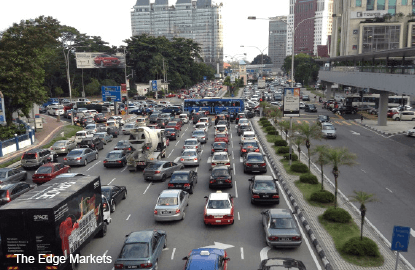
IF you’re anything like the three million car owners living in the Klang Valley, you’ve probably spent an inordinate number of hours sitting in traffic. What bothers me most about traffic is that we have unwittingly accepted it as a way of life. In fact, we’ve become more than happy to pay a small fee every day to sit through a jam on something called, quite ironically, an expressway.
We all seem to know the problem - too many cars on highways that can’t meet capacity - but can’t figure out what best to do next. In 2010, in the Klang Valley, only 17% or approximately 1.2 million trips per day were completed using public transport. Though the data is a bit dated, it probably remains true today and is not entirely surprising.

Do we have real solutions to beat traffic? We can start earlier. Take an alternative route. Take public transport. But for the most part, we compliantly sit there in traffic. And I’m sure there are plenty of reasons for that too. Some of us have to take the morning school run and drop the kids off. For me, the daycare that I take my son to doesn’t open any earlier than 8am. So there I am, sitting in traffic inching my way in peak-hour traffic to my office smack in the middle of town.
And that pretty much describes financial planning (yes, you knew I would get there!). There will be many times in our lives when we run into financial congestion. You want to get to your destination, but there are just too many things in the way. You’re just stuck and not getting anywhere. You’re weaving in and out of lanes and hoping maybe you can save a few minutes, but there are the financial equivalent of cars honking at you. They just won’t let you through, and you’re resisting the temptation to let your frustration show. As time wears on, your patience is tested. You’re physically and mentally tired. You are definitely late by this time and whoever is waiting for you is calling and rushing you. It can be frustrating.
Like traffic, our personal financial situation depends a lot on our attitude toward money. You don’t have to be mathematically gifted or investment savvy to make a difference. You could be a Michael Schumacher-like driver. But let me assure you, if he were stuck in traffic next to you, he would be as slow as you. The point is this: we can make the best of a bad situation or make a bad day worse.
Ever noticed that you get especially stressed in a traffic jam when you are desperately trying to get somewhere on time and know that the congestion is going to get you into trouble? Sometimes it stems from unrealistic expectations. You left the house just 10 minutes too late and were hoping to make it back on the road so you could get to work on time. Lo and behold! The traffic is the same as yesterday as it will be tomorrow (and, I assure you, the day after as well).
Planning for your future is the same. A lot of us put off till tomorrow what we can and should do today, thinking it’s okay to start five years later because, by then, we would be earning more, can set more aside and finally catch up. News flash! There is going to be as huge a demand on your money today as there will be tomorrow. Maybe even more. As the deadline for your financial goal looms, the anxiety begins.
You won’t be able to get there and your savings are growing at a snail’s pace. Start by realistically anticipating how long it will take and plan your journey there.
When people have somewhere to get to and they’re held up, they can get pretty desperate. A common practice is to keep changing lanes to grab that bit of headway. I’m sure you’ve done it before. Your lane isn’t moving, so you switch to one that is. To most people, action is preferred to inaction. To do nothing is frustrating, so why sit in a lane that’s not moving? But switching lanes adds to anxiety and increases the risk of an accident, what with cars trying to cut you off. I’ve seen similar behaviour when it comes to investment returns. Investors are sitting in a stock or fund that doesn’t seem to be doing much, so they decide to switch to another investment. This impatience, fuelled by emotion, may not be driven by fundamentals and could instead result in unnecessary transactional costs. Reduce your anxiety by sticking to a strategy and only changing it if absolutely necessary.
Lastly, how many times have we seen someone attempting to bypass traffic by driving illegally on the emergency lane? My husband jokingly calls it the turbo lane. It is crucial to keep the emergency lane clear because there may be vehicles that need to pull aside for legitimate reasons. Speeding down an emergency lane is dangerous. When it comes to your finances, it’s all too easy to get carried away with some get-rich-quick scheme with the promise of high returns that will propel your savings. An aptly repeated word of caution: if it’s too good to be true, it probably is. Let cooler heads prevail and don’t make rash decisions in your haste to get where you are going. It could get tragic.
So, when it comes to your finances, plan ahead, stick to a strategy and accept that there are no shortcuts. Remember, there could be loved ones on the same journey who need you to arrive safely at your destination.
* Ong Shi Jie (CJ) is head of integrated marketing and analytics at OCBC Bank (M) Bhd.
** This article first appeared in Money + Wealth, digitaledge Weekly, on Sept 7 - 13, 2015. Click here to subscribe from RM30 for the digitaledge Weekly and digitaledge Daily.